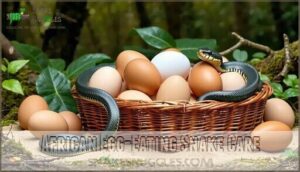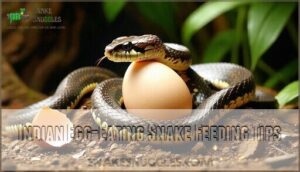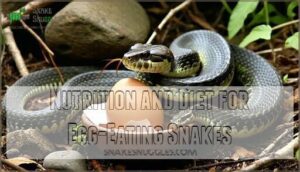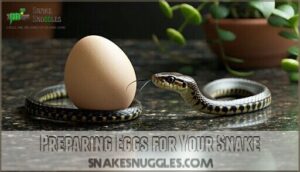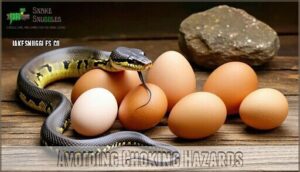This site is supported by our readers. We may earn a commission, at no cost to you, if you purchase through links.
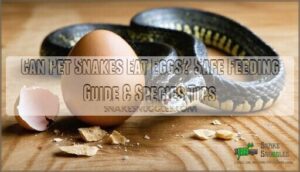 The answer to "can pet snakes eat eggs" depends on the species.
The answer to "can pet snakes eat eggs" depends on the species.
Specialized egg-eating snakes like African Dasypeltis and Indian Elachistodon require eggs as their primary diet—they’ve evolved unique throat projections to crack shells internally and regurgitate fragments.
Most other pet snakes can enjoy eggs occasionally as nutritious treats, gaining calcium from shells and complete proteins from contents.
However, non-specialist species face risks including bacterial contamination, choking hazards from sharp fragments, and nutrient deficiencies if eggs replace their regular prey.
The key lies in matching the right feeding approach to your snake’s biology and ensuring proper preparation techniques.
Table Of Contents
- Key Takeaways
- Can Pet Snakes Eat Eggs?
- Egg-Eating Snake Species as Pets
- Nutrition and Diet for Egg-Eating Snakes
- Feeding Eggs to Snakes Safely
- Egg-Eating Snake Health Considerations
- Housing and Handling Egg-Eating Snakes
- Frequently Asked Questions (FAQs)
- Are egg-eating snakes good pets?
- Can snakes eat eggs?
- How do you feed a snake egg?
- What snakes eat their own eggs?
- What happens when a snake eats an egg?
- What pet snakes only eat eggs?
- Can I feed my snake eggs instead of mice?
- What egg types are safe for pet snakes to consume?
- How often can pet snakes be fed eggs safely?
- Do eggs provide all necessary nutrients for pet snakes?
- Conclusion
Key Takeaways
- Species matters most – Only specialized egg-eaters, like African Dasypeltis, can thrive on an all-egg diet, while your ball python or corn snake should stick to rodents, with eggs as occasional treats.
- Size and preparation are critical – You’ll need to match egg size to your snake’s head width and remove shells for non-specialist species to prevent choking hazards and impaction.
- Nutritional balance is essential – Eggs do not provide complete nutrition for most pet snakes, so you cannot replace their regular prey meals without risking serious deficiencies.
- Monitor closely for safety – You should watch for signs of bacterial contamination, digestive issues, or metabolic problems when introducing eggs into your snake’s diet.
Can Pet Snakes Eat Eggs?
You might wonder if your pet snake can safely eat eggs, and the answer depends entirely on the species you own.
While specialized egg-eating snakes thrive on an all-egg diet, most common pet snakes like ball pythons and corn snakes should stick to their regular rodent meals with eggs only as occasional treats.
Egg-Eating Snake Species
Meet the fascinating egg-eating snake species that thrive on nature’s perfect protein package. Only two genera worldwide have mastered this specialized diet through remarkable egg adaptation and unique feeding techniques.
Key egg-eating snake species include:
- Dasypeltis species (African egg-eaters) – 17 recognized species with specialized throat projections
- Elachistodon westermanni (Indian egg-eating snake) – sole Asian specialist with similar adaptations
- Opportunistic feeders – various colubrids that occasionally consume eggs but aren’t obligate egg-eaters
These snakes that eat eggs showcase incredible snake behavior, using flexible jaws and throat modifications to crack shells internally while regurgitating empty fragments. The unique characteristics of these snakes can be further understood by studying their egg eating habits.
Benefits of an Egg Diet for Snakes
Understanding which snakes that eat eggs can benefit from this specialized diet helps you make informed feeding decisions.
An egg based diet offers several advantages for appropriate species:
- Calcium Boost: Eggshells deliver concentrated calcium, supporting strong bones and preventing metabolic bone disease in egg eating snakes.
- Digestive Health: The natural fiber from shells aids digestion and reduces impaction risks when feeding snakes eggs properly.
- Egg Nutrition: Whole eggs provide complete proteins and essential nutrients that support snake growth and overall health in species adapted for a snake eggs diet.
The advantages of an egg-based diet are clear, with benefits ranging from calcium and digestive health to overall nutrition, making it a valuable option for snakes that eat eggs.
Potential Risks of Feeding Eggs to Snakes
While eggs can benefit specialized species, egg feeding snakes carries significant risks.
Bacterial contamination from improperly stored eggs can cause severe illness.
Egg choking hazards arise when shells break incorrectly during consumption, creating sharp fragments that damage throat tissues.
Nutrient deficiency develops quickly in non-specialist species fed eggs exclusively.
Understanding the unique needs of an egg eating snake is essential for their proper care and feeding.
| Risk Type | Potential Issues |
|---|---|
| Physical Dangers | Shell toxicity, impaction risks, digestive blockages |
| Nutritional Problems | Nutrient deficiency, metabolic imbalances, stunted growth |
| Health Complications | Digestive issues, bacterial infections, regurgitation |
Monitor your snake’s eating eggs safely practices closely.
Egg-Eating Snake Species as Pets
If you’re considering an egg-eating snake as a pet, you’ll need to understand their specialized care requirements.
These fascinating reptiles aren’t beginner-friendly pets, but they can thrive in captivity with proper knowledge and dedication.
With dedication and proper knowledge, these specialized snakes make rewarding companions for experienced keepers
African Egg-Eating Snake Care
African Egg-Eating Snakes make rewarding pets when you understand their unique needs.
These docile creatures won’t bite, but they require specific Snake Habitat conditions to thrive.
- Enclosure Setup: Use a 36x18x12 inch tank with secure lid, maintaining 85-90°F daytime temperatures with 95°F hotspot
- Environment: Keep humidity at 50-60%, provide branches and hides for their semi-arboreal Snake Behavior
- Substrate: Choose aspen bedding or cypress mulch for proper moisture retention and easy cleaning
- Feeding Schedule: Offer 1-2 appropriately sized eggs weekly, ensuring proper Egg Nutrition without overfeeding
Proper snake care involves understanding snake enclosure requirements to create a healthy environment.
Indian Egg-Eating Snake Feeding Tips
For ideal Indian egg-eating snake nutrition, offer quail eggs weekly.
These specialized egg eating snake species thrive on proper egg size selection and consistent feeding schedules.
| Feeding Aspect | Recommendation |
|---|---|
| Egg Type | Quail eggs (preferred), small chicken eggs |
| Frequency | Every 7-10 days |
| Preparation | Shell-on for digestive health |
Monitor your snake’s weight to adjust egg preparation methods.
Their unique digestive system handles whole eggs efficiently, making these pet snake feeding guidelines essential for snake care tips success.
South American Egg-Eating Snake Habitat Requirements
When setting up your South American egg-eating snake’s home, you’ll need to create a tropical paradise.
These snakes that eat eggs thrive in specific conditions that mirror their natural habitat.
Essential habitat requirements include:
- Temperature Ranges: Maintain 75-85°F (24-29°C) with proper heating elements
- Humidity Levels: Keep moisture at 60-80% using misting systems or humid hides
- Substrate Needs: Use sphagnum moss and coconut fiber blend for ideal moisture retention
Provide shallow water dishes for drinking and soaking areas for shedding.
Nutrition and Diet for Egg-Eating Snakes
You’ll need to understand the specific nutritional requirements for egg-eating snakes to keep them healthy and thriving.
Their specialized diet demands careful attention to feeding schedules, egg preparation, and calcium balance.
Hatchling Vs Adult Diet for Egg-Eaters
Your snake’s appetite grows alongside its body.
Hatchlings need tiny finch or budgie eggs every 4-7 days, while adults handle quail eggs weekly.
Growth rates and dietary adaptation vary between individuals, making careful monitoring essential for proper snake nutrition facts.
Understanding the snake diet basics is vital for providing the right nutrients.
Life Stage Egg Size Feeding Frequency
Feeding Whole Eggs Vs Eggshells
In regards to whole eggs versus eggshells, your snake’s digestion process handles complete eggs naturally. Egg nutrition from whole eggs provides balanced protein and fats, while shell removal isn’t necessary for specialist egg-eaters who regurgitate empty shells.
Consider these feeding methods for ideal egg consumption:
- Egg size should match your snake’s head width for safe swallowing
- Quail eggs work best for smaller species due to thinner shells
- Snakes eating eggs whole utilize internal throat projections to crack shells
- Snake nutrition facts show whole eggs provide complete amino acid profiles
- Can snakes eat eggshells? Yes, but only specialist species digest them properly
Your egg-eating snake’s throat contains specialized bony projections that crack shells internally, allowing them to swallow contents while regurgitating empty shells naturally. Understanding egg eating snakes is vital for their proper care and nutrition.
Calcium Supplementation for Egg-Eating Snakes
Getting the mineral balance right is vital for your snake bone health.
Dust eggs with calcium powder 2-3 times weekly to prevent calcium deficiency and support proper reptile nutrition.
Egg shell calcium provides natural supplementation, but additional dietary supplements help your egg eating snake meet all snake nutrition requirements for peak development.
Feeding Eggs to Snakes Safely
When feeding eggs to your pet snake, proper preparation and safety measures are vital for preventing health complications.
You’ll need to monitor your snake closely during feeding to guarantee safe consumption and avoid potential choking hazards.
Preparing Eggs for Your Snake
Proper egg preparation forms the foundation of safe snake nutrition and directly impacts your pet’s health. Quality matters more than quantity when selecting eggs for your snake’s diet plan.
Key preparation steps for better egg safety:
- Select appropriately sized quail eggs – they’re perfect for most egg-eating species
- Use fresh, room-temperature eggs to prevent digestive shock
- Remove shells for non-specialist species to avoid impaction risks
- Inspect eggs thoroughly for cracks or contamination before feeding
- Feed immediately after preparation to maintain freshness and prevent bacterial growth
Choose quail eggs over chicken eggs for better size management. Room temperature eggs digest easier than cold ones. Shell removal depends on your snake’s natural feeding techniques – specialist egg-eaters handle whole eggs, while others need shells removed for proper snake health.
When sourcing quail eggs, consider the quail egg products available to guarantee a consistent supply for your pet snake.
Avoiding Choking Hazards
Once you’ve got your eggs ready, size matters more than you might think. Egg size should match your snake’s capacity – offering oversized eggs creates serious airway obstruction risks.
Shell thickness also plays a role in safe consumption. Choose quail eggs for smaller species and chicken eggs for larger ones.
Proper feeding techniques involve presenting one egg at a time, allowing your snake to position it naturally. This pet snake food approach prevents choking incidents that can turn feeding time dangerous.
Smart snake care advice means matching egg dimensions to your snake’s mouth opening, ensuring safe reptile egg consumption.
Monitoring Your Snake’s Egg Consumption
Careful observation helps you catch potential problems before they become serious health issues.
Watch your snake’s feeding behavior and adjust your approach based on their response to different egg types and sizes.
Here are key monitoring points for Egg Eating Snakes:
- Egg Intake frequency – Track how often your snake accepts eggs and note any changes in their Consumption Rate over time
- Snake Nutrition balance – Monitor Egg Size preferences and verify your Feeding Schedule matches your snake’s natural rhythm
- Digestive response – Watch for regurgitation, lethargy, or unusual behavior after reptile egg consumption sessions
- Physical condition – Check body weight and overall health to confirm your snake diet plan supports proper growth and development
Regular monitoring of egg consumption patterns helps you fine-tune your snake care and nutrition approach for superior results.
Egg-Eating Snake Health Considerations
Maintaining your egg-eating snake’s health requires careful attention to their unique nutritional needs and potential deficiencies.
You’ll need to monitor for signs of metabolic bone disease and guarantee proper vitamin absorption, as an egg-only diet can create specific health challenges that require proactive management to ensure proper vitamin absorption.
Vitamin and Mineral Requirements
Balanced nutrition forms the foundation of healthy egg-eating snakes.
Calcium needs dominate your snake’s nutrient balance since eggs alone can’t provide adequate minerals.
You’ll need vitamin supplements containing D3 for proper calcium absorption and bone development.
Mineral deficiencies in iron, copper, and zinc commonly occur with egg-only diets.
Commercial reptile multivitamins help prevent these gaps while supporting your snake’s protein requirements and overall health through thorough reptile nutrition.
Preventing Metabolic Bone Disease
Metabolic bone disease threatens your egg-eating snake’s bone health when calcium balance goes wrong. Your snake needs proper Vitamin D3 synthesis and calcium balance to maintain strong bones throughout its life.
- Monitor for weakness, soft bones, or abnormal posture as early warning signs
- Provide UVB lighting within 12 inches of basking spots for natural Vitamin D3 production
- Supplement with calcium if your snake diet and nutrition lacks whole prey items
- Schedule veterinary checkups including blood tests to catch mineral deficiency early
Understanding snake metabolic issues is essential for preventing long-term damage.
Housing and Handling Egg-Eating Snakes
Creating the right home for your egg-eating snake requires specific attention to their unique needs and gentle nature.
You’ll need to provide proper housing conditions and learn careful handling techniques since these specialized feeders are more delicate than typical pet snakes, which is crucial for their well-being and requires gentle care.
Enclosure Size and Type for Egg-Eaters
Most snake species thrive in 40-gallon terrariums with secure lids and adequate Ventilation Systems.
Choose glass or PVC Enclosure Materials for easy cleaning.
Maintain Humidity Control at 50-60% using water bowls and proper Substrate Depth of 2-3 inches.
Install Temperature Gradients from 75-85°F to support your pet snake care routine and natural Egg Eating Snake Behavior patterns.
For ideal snake habitats, consider terrarium products when setting up their enclosures.
Heating and Lighting Needs for Egg-Eating Snakes
Proper Temperature Control creates a thriving environment for your egg-eating snake.
Establish Thermal Gradients with basking spots at 85-90°F and cool zones around 75-80°F using quality Heat Sources like ceramic heaters.
UVB Lighting supports healthy snake diet metabolism and natural egg eating snake behavior.
Maintain consistent Lighting Cycles with 12-hour day/night periods for ideal reptile nutrition guide results.
Handling Tips for Egg-Eating Snakes
Handling your African Egg Eating Snake requires patience and respect for these specialized creatures. Move slowly to avoid startling them, as sudden movements can trigger defensive responses that stress both you and your snake.
Key handling principles for snake safety:
- Support their entire body – Never grab just the head or tail during handling sessions
- Wash hands thoroughly before and after contact to maintain proper snake hygiene
- Wait 48 hours after feeding before handling to prevent regurgitation issues
These snakes are naturally docile, making them easier to handle than many species. However, their delicate nature means gentle, confident movements work best. Clean hands prevent transferring oils or bacteria that could affect their health, especially important given their specialized egg consumption habits and unique feeding techniques.
Their gentle nature makes handling enjoyable, but respect their delicate feeding adaptations with slow, confident movements
Frequently Asked Questions (FAQs)
Are egg-eating snakes good pets?
Only 17% of snake species naturally consume eggs as their primary food source.
Egg-eating snakes aren’t ideal for beginners—they’re delicate creatures requiring specialized care, specific temperatures, and exact egg sizes.
You’ll need experience with reptile husbandry, as they require specialized care.
Can snakes eat eggs?
Yes, snakes can eat eggs, but it depends on the species.
Specialist egg-eaters like Dasypeltis have unique adaptations for consuming eggs whole, while most pet snakes should stick to rodent-based diets for ideal health.
How do you feed a snake egg?
For specialist egg-eating snakes, offer appropriately sized bird eggs (like quail eggs) whole. They’ll swallow and internally crack them, then regurgitate empty shells. Non-specialist snakes shouldn’t eat eggs regularly.
What snakes eat their own eggs?
Like a mythical ouroboros devouring its tail, no snake species naturally eats their own eggs.
You’re thinking of egg-eating snakes that consume bird eggs, not their own offspring.
These specialized species crack and swallow bird eggs whole, which can be seen as a unique adaptation, highlighting the egg-eating behavior of certain snakes.
What happens when a snake eats an egg?
When your snake swallows an egg, it’ll crack the shell using throat spines, digest the nutritious contents, then regurgitate the broken shell pieces—nature’s perfect recycling system.
What pet snakes only eat eggs?
African egg-eating snakes (Dasypeltis) exclusively consume bird eggs.
You’d keep these specialized serpents if you’re experienced, since they’re delicate pets requiring specific quail eggs weekly and precise temperature control for survival.
Can I feed my snake eggs instead of mice?
Only specialized egg-eating snake species can replace mice with eggs completely. Most pet snakes need rodents as their primary diet, as eggs alone don’t provide complete nutrition for non-specialist species.
What egg types are safe for pet snakes to consume?
Quail eggs work best for most pet snakes due to their smaller size and thinner shells.
Chicken eggs suit larger species, while duck eggs are only for very large snakes that can handle them safely.
How often can pet snakes be fed eggs safely?
Like a delicate balance on a tightrope, feeding frequency matters immensely.
You should offer eggs only once weekly for specialist egg-eating snakes, while other species need them just occasionally as treats, not regular meals.
Do eggs provide all necessary nutrients for pet snakes?
No, eggs don’t provide complete nutrition for your pet snake.
They lack essential vitamins, minerals, and balanced nutrients found in whole prey.
You’ll need rodents as the primary diet for proper health.
Conclusion
Deciding whether you can pet snakes eat eggs isn’t just about species—it’s about understanding your snake’s evolutionary blueprint.
Specialized egg-eaters like Dasypeltis thrive on whole eggs, while ball pythons and corn snakes should only receive them as occasional treats.
You’ll need to match feeding methods to biology: whole eggs for specialists, careful preparation for generalists.
Remember that improper egg feeding can cause choking, nutritional imbalances, or bacterial infections.
When done correctly, eggs provide excellent calcium and protein supplementation for your serpentine companion.
- https://en.wikipedia.org/wiki/Dasypeltis
- https://mikesexotics.com/articles/no-mice-required-egg-eating-snake-care-guide
- https://snakesarelong.blogspot.com/2012/06/egg-eating-snakes.html
- https://www.aussiepythons.com/threads/feeding-eggs-to-snakes.204166/
- https://reptilesmagazine.com/ball-python-diet-and-feeding/

